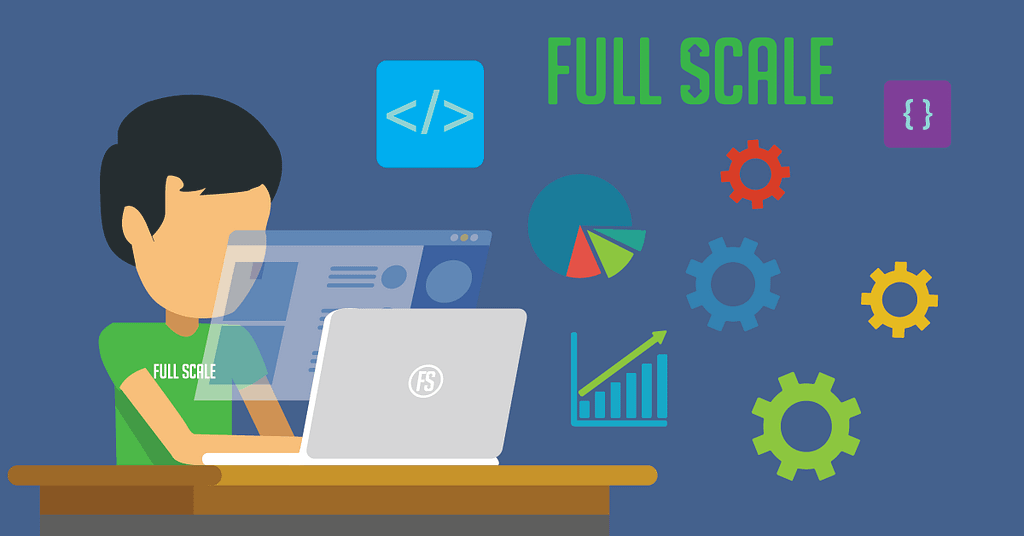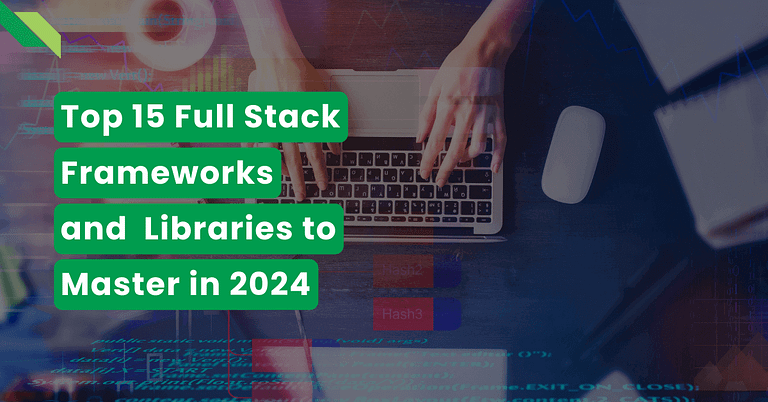Last Updated on 2024-10-11
Updated on January 2, 2024
Learning is a lifelong process, especially in software development. If you’re a full-stack developer, check out these full-stack frameworks you should look into this year.
The world of technopreneurship is still reeling from the effects of the pandemic. Businesses try their best to adapt to the changing market landscape through tech. As such, they will need professionals who can handle design, database management, and front-end and backend development.
That is why full-stack developers who can develop software from front to back will be in demand. So, it’s time to be acquainted with the latest frameworks and tools to ensure you’re at the top of your game.
Top 15 Full Stack Frameworks to Master This Year
In this article, we’ll dive into the top full-stack frameworks you can learn and why you should practice them. Check them out and find the ones that can help further your full-stack development career.
1. React.js
React is a JavaScript library used to build user interfaces. Its component-based architecture and virtual DOM allow for the easy development of interactive and dynamic web applications. When used with Node.js in your backend development, you can create high-performance and scalable applications.
Facebook created React.js with a vast ecosystem. Today, companies like Walmart, Netflix, and Airbnb have adopted this framework.
React.js is reliable, easy to learn, and efficient. But it can be a powerful full-stack development framework to use. So, it’s something to consider mastering this year.
2. Vue.js
Vue.js is an open-source frontend framework that helps developers build user interfaces efficiently. It can be built on CSS, JavaScript, and HTML to provide a component-based and declarative programming model.
But why is it gaining popularity as the “progressive JavaScript framework”?
Vue.js gives you a flexible component architecture and a reactive data binding system. So if you’re looking for a lightweight yet practical framework to learn, try to be an expert on Vue.js.
3. Angular
This is one of the most commonly used frameworks in the market. Angular is an open-source full-stack framework developed and maintained by Google.
The framework helps you develop scalable and robust single-page web applications. It uses TypeScript, a superset of JavaScript that allows for improving your code quality.
What’s more? Angular has features like an automated form validation system, dependency injection, and two-way data binding. These features allow you to develop faster and more easily.
4. The MEAN Stack
Speaking of popular choices of full-stack developer frameworks, the MEAN tech stack deserves an honorable mention.
It is a combination of Node.js and Express.js technologies, which gives the following benefits:
- Develop web applications quickly and efficiently through JavaScript
- Enable good performance and high scalability for your application
- Enjoy a deep pool of libraries and a set of features
- Get support and advice from an active community of developers
Let’s get to know the two techs involved in this robust framework.
4.1 Node.js
Node.js is a runtime environment built on Chrome’s V8 engine that helps you run JavaScript on the server side. This framework works well in creating fast and scalable network applications.
4.2 Express.js
This framework is minimalistic but robust. Express.js simplifies the process of building APIs and web applications when used together with Node.js. It also delivers an intuitive and clean interface that makes creating efficient and scalable server-side applications easier.
Considering all these, learning both will clearly upgrade your full-stack developer skills.
5. Django
Python enthusiasts are gonna love this news!
Django, a high-level Python web framework, can help your full-stack development project a breeze. It provides comprehensive tools and libraries to build secure and scalable web applications.
When you know how to use this framework, you no longer need to worry about managing databases and other low-level details. You can even use its modern features, such as its template engine for HTML views or an object-relational mapper to interact with databases.

6. Ruby on Rails
Often referred to as Rails, Ruby on Rails is known for its simplicity and conventional over-configuration approach.
It follows the do-not-repeat-yourself principle, which helps you develop applications rapidly. No wonder it is popular among full-stack developers for both small and enterprise software development projects.
With its vast library of open-source code, you can readily find code snippets and add functionality to your project. Moreover, it is regularly updated. Its new features and security fixes make it one of the most stable and reliable frameworks for full-stack development.
Rails might be your best friend if you’re a fan of elegant code, productivity, and rapid prototyping.
7. Laravel
Hey, it’s the go-to framework of PHP developers. Laravel follows the MVC pattern, which offers a clean and elegant syntax.
It also provides rich features, such as routing, caching, and ORM. They allow developers to enjoy building modern and scalable web applications.
8. ASP.NET
ASP.NET stands for Active Server Pages Network Enabled Technologies. It is a robust framework developed by Microsoft to help developers build enterprise-level applications.
What does its extensive library and tool support do? It helps developers build secure and high-performing applications and services across different platforms.
This framework is best suited with HTML, JavaScript, and CSS. Moreover, you can create web APIs and WebSocket APIs through this framework.
9. Spring Boot
Did you know? When Spring Boot is built on top of the Spring framework, it simplifies Java application development.
This method provides an opinionated approach to configuration and reduces boilerplate code. As a result, developers can focus on building robust and scalable applications.
What’s more, the framework has features that make it easier for you to build production-ready apps. This way, you are more confident they will run smoothly during production. Lastly, Spring Boot is customizable, so you can comfortably create parameters to make it work according to your specifications.
10. Flask
Are you looking for a lightweight and flexible framework for Python? Consider learning Flask.
It’s a microframework that does not require specific tools or libraries. So the simplistic and minimalistic design makes it an excellent choice for small to medium-sized applications.
Flask also empowers developers to build web applications quickly without unnecessary complexity. Also, it’s more conducive to tracking your app’s modular structure due to its lack of default boilerplate code.
11. GraphQL
Using a query language, GraphQL can help you query and connect APIs to existing data. The framework can also help you describe APIs wholly and understandably. This way, you or your clients can ask for specific queries and generate predictable results based on your needs.
But wait, there’s more! Even without writing any server code, you can write your client code and make requests immediately. GraphQL also helps you get more functionality with less code while easily adding new data to your API or developing it without affecting the existing app.
With GraphQL, you can write simple client code but still build a reliable and high-performing app. This full-stack framework is definitely worth learning.
12. Bootstrap
Another famous full-stack developer framework makes it to the list. Say hello to Bootstrap, a free, open-source framework that helps you build responsive and dependable websites with ease.
It includes JavaScript, CSS, and HTML design templates for interface components. Also, it has built-in navigation bars, buttons, and other components.
And the best part is that Bootstrap is compatible with major web browsers, making it possible to build cross-platform apps smoothly.
13. jQuery
Looking for a small JavaScript library that is loaded with features? Look no further than the robust and reliable jQuery! This technology makes it easier for you to do the following tasks:
- Handle events
- Implement Ajax
- Modify HTML documents
- Make animations
- Add functionality from thousands of available plugins
- Get support from an active community of developers
No wonder jQuery is one of the most used full-stack frameworks. And if you haven’t learned it yet, then it’s time to explore it.
14. Symfony
Symfony is an open-source and free PHP framework. It has a set of reusable component libraries and a range of features available to hasten the development of web applications.
This full-stack framework boasts an extendable architecture that enables you to add new functionalities and features. So it’s a considerable choice for projects needing an extensible framework. That is why you may want to familiarize yourself with it, too.
15. Ember.js
Ember.js is a JavaScript framework that prioritizes convention over configuration. It comes with an integrated development environment, Ember CLI, streamlining the development process.
This framework provides a well-defined structure and powerful features, which makes it ideal for large-scale applications.
Learning Possibilities for Full Stack Developers
It’s never too late to learn all these full-stack frameworks. There is no time limit to hone your skills.
Just choose one (or as many as you want) full-stack frameworks to work on. Find the proper training online or join developer communities. And you’re on your way to adding more skills to your already impressive list.
Work As A Full Stack Developer at Full Scale
Are you a full-stack developer looking for a job? You came to the right place.
Full Scale is again an Inc. 5000 lister and an offshore software development company. We assist businesses in finding, vetting, and building a software development team quickly and affordably.
At Full Scale, we offer a supportive environment for each team member to grow and develop professionally. Since we have a fully remote setup, any applicant from anywhere in the Philippines is welcome to join our awesome team.
Take a giant leap in your career with us. And enjoy a work-life-balance-led mindset work setup.
Send Your Application Now!

Matt Watson is a serial tech entrepreneur who has started four companies and had a nine-figure exit. He was the founder and CTO of VinSolutions, the #1 CRM software used in today’s automotive industry. He has over twenty years of experience working as a tech CTO and building cutting-edge SaaS solutions.
As the CEO of Full Scale, he has helped over 100 tech companies build their software services and development teams. Full Scale specializes in helping tech companies grow by augmenting their in-house teams with software development talent from the Philippines.
Matt hosts Startup Hustle, a top podcast about entrepreneurship with over 6 million downloads. He has a wealth of knowledge about startups and business from his personal experience and from interviewing hundreds of other entrepreneurs.





